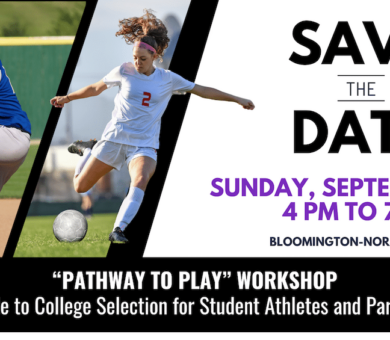Communication That Works When Talking to Your Child About Sports and the Recruiting Process
You have a 10-year old daughter who seems to enjoy playing sports. When is the appropriate time to begin communicating with her about the college recruiting process?
In a Find My Team poll, we asked high school parents how much they talked to their child about the recruiting process. Forty-seven percent said they never or hardly ever talk to their children about recruiting. That means that almost one in two families, who have athletes who might play college sports, are not having these conversations.
That said, the recruiting process is a different journey for every person who has the opportunity to potentially play in college. It’s a different journey for every parent as well. As someone who has watched hundreds of female athletes make the journey, I have had the opportunity to hear many stories about how and when this communication took place in the lives of the athletes I coached.
In reality, there are both advantages and disadvantages of communicating early.

Advantages of Early Communication
Communicating early with your daughter about the recruiting process and the possibility of playing college sports has several advantages.
Keeps It Current
Talking about college with your freshman daughter is not a bad thing. You can begin to ask her questions about college, her major, where she would like to go and what her initial thoughts are.
She may not have answers to these questions yet, which is okay. By asking the questions, though, you place the thoughts that eventually grow into answers. She’ll think about college more when there are questions posed to her.
Allows Time for It to Become Real
Many young girls do not start out confident with how they play sports, even if they are pretty good. It is something that grows with time. So, when parents talk to her about the possibility of playing sports in college, the thought becomes real.
Some young girls see women play college sports, but many are not exposed until later in their high school career. They see a lot of men playing sports on television and the internet, but it is a little harder to find women’s sports. Women only get 4% of the current media coverage in sports.
Promotes Early Planning
When you know early that your daughter may want to play college sports, it gives you time to plan. Planning to tackle the recruiting process is a scary thing, but if you begin early, it becomes easier.
Procrastinating leads to a much more stressed and hectic process with both you and your daughter rushing to meet deadlines, squeezing in campus visits, filling out loads of paperwork and making quick, and sometimes bad, decisions.
Helps Keep It in Perspective
As your daughter matures, certain things will stand out as being more important to her. Knowing what these are, and even watching their progression, is helpful to both you and your daughter when she begins to get serious about which colleges are on her list.
Without early communication about the factors that become important to her, there is a tendency for those to get pushed aside or forgotten about until it is too late. Early communication permits these things to stay at the forefront when it comes to decision-making about college and recruiting processes.
Puts Everyone on the Same Page From Day One
If you and your daughter begin her sports career on the same page, chances are you’ll also begin the recruiting process on the same page. This will only happen if there is good communication that occurs regularly.
Builds a System of Encouragement and Support
Most importantly, early communication with your daughter embeds a system of encouragement and support. This is key not only to her experiencing the ups and downs of being an athlete, but also the inconsistencies and challenges that come with the recruiting process.
Establishing an environment of encouragement and support early will produce a very different experience than if that system is not in place.
Learning and sharing as much as you can together will only build on your already positive and solid relationship. She will need you in more ways than you can imagine when it comes to sports, the recruiting process, college and college athletics.

When Early Communication Backfires
As with most things, there could be a time when early communication backfires on parents. Most of the time, this is due to the tone and frequency of the communication. Below are a few negatives that could happen if your tone is too directive and you are conversing too much.
Becomes Too Much
So your daughter is 10 and likes sports, and your communication around her sport is directed toward how much she plays, how good or bad she plays, who she plays for and how much extra time she puts in. You feel her excitement and then begin to take on her excitement, almost to the point of making it yours.
Next come the personal trainer, individual workouts, nutrition guidelines, playing for certain travel teams, etc. She is only 10. I’m exaggerating a little, but your communication in this sense could become overwhelming to your daughter. The whole thing could fizzle out before it even gets going.
It’s all in the way you communicate. If you become another “coach,” she will probably not want to talk to you much. She already has a coach. She may just want you to be encouraging and positive.
Builds the Pressure Cooker
If your communication is geared towards her continuing to improve and pushing her to get better before she is ready, the pressure will build and, sooner or later, there will be an explosion. Starting early does not mean putting a ton of pressure on her. This could lead to early burnout, and she may want to quit playing.
Help her keep it as fun as you can for as long as you can. Let the pressure be in the game she plays, not in the home she lives.
Promotes Nagging Parents
Early communication could be construed as “nagging.” This could definitely backfire and possibly lead to the pressure and burnout already described. If she tells you that you are getting on her nerves, or she begins to avoid conversation with you, it could be because you are constantly nagging or trying to force conversation.
As time goes on, if she is a recruited athlete, there will be some pressure on where to go and when to decide. If you feel like you have to nag, that means she may not be as interested as you think or she is getting tired of it all.
If she is getting tired, it does not necessarily mean she won’t play anymore, but you should listen and be aware of how she is acting and what she is saying. She may just need a healthy break.

Building Communication That Works
So what is the right thing to do? Should you begin communicating early with your children? The answer is based on personal situations, as with most of the answers to questions about the recruiting process. It depends on the situation and circumstances for you and your daughter.
Here is a formula to help build that communication so that it works with your daughter and prepares her for the possibility of playing sports beyond club/travel and high school.
It Has to Be Genuine
Honest communication with your daughter is the best solution. If she truly feels like you are genuine, she’ll probably continue to come to you to talk about sports and recruiting. If she feels like you are just saying things because you are her parent, or because you want her to get a scholarship, she will feel it and the conversations will change.
Encouragement Early Builds Confidence
If you can build confidence early in your daughter’s sports career, that will help her become a stronger person, first and foremost. Encouraging her through the ups and downs of sports, and not allowing her to get too high when things are good or too down when things are rough, will help her learn to stick with it no matter what. She’ll become more confident both as an athlete and as a person.
Confidence Leads to Free Thinking
When she is confident, chances are she will feel good about making her own choices. This will help her decide if she wants to continue playing and how she wants to approach the recruiting process. If you have done all the communicating and thinking for her up to this point, it may be tough for her to think and speak when you are not there. Allowing her to make choices in the conversations and answer in her own voice will benefit her process tremendously.
Free Thinking Leads to Empowered Choices
As you build a confident person who is able to speak in her own voice and think freely, you have empowered your daughter to take on not just the thought of college and the recruiting process, but also academic choices and areas of study in college.
Empowered Choices Lead to Doing Her Own Work
When she feels empowered, she will want to do her own work. In other words, when it comes to figuring out what she wants to do with her life, college and the recruiting process, she’ll be able to handle it. She’ll be prepared to make tough decisions and she won’t be afraid to do the work that leads to her choices.
Doing Her Own Work Leads to Making the Right College Choice
When she does her own work, she takes ownership of it. And when she takes ownership of her decisions, she has created the best opportunity for herself to make the right choices for college and beyond. She’ll most likely find the right college and sports program for her best interest. In the end, that is exactly what you want for her.


